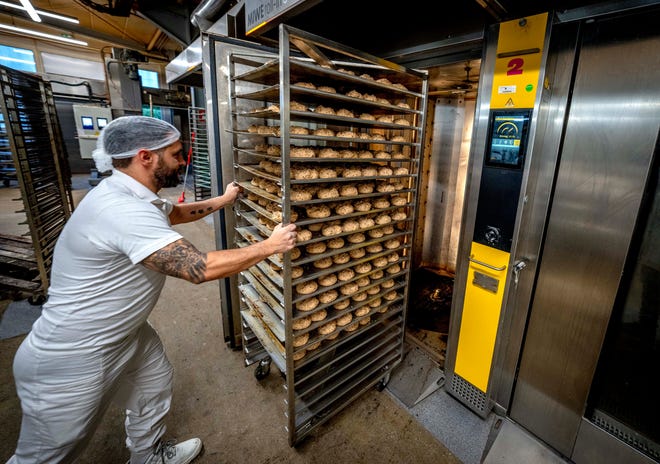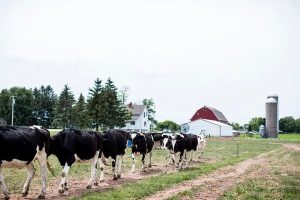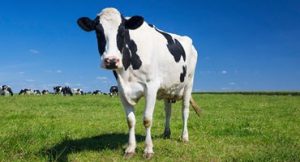
From supply chain disruptions and labor shortages wrought by a global pandemic to the economic fallout and rising inflation, a panel of international dairy industry insiders shared their views during the Global Dairy Symposium at World Dairy Expo.
Hosted by the Wisconsin Department of Agriculture, Trade and Consumer Protection (DATCP), panelists included fifth generation farmer Sheryl Meshke, co-president and Chief Executive Officer of Associated Milk Producers Inc., Ad van Velde, Netherlands dairy farmer and president of Globral Dairy Farmers, Pennsylvania dairy farmer Marilyn Hershey who serves as chair of Dairy Management Inc, and Torsten Hemme, founder and CEO of the International Farm Comparison Network Dairy Research Network.
With U.S. milk production climbing again, August data demonstrated that international customers are eager for more U.S. dairy products even as macroeconomic concerns abound. However, to ensure those trade relations in a hyper-competitive export market, Hemme says U.S. dairy producers and processors must do more than just supply a superior product.
“The opportunity is there, and the other is your own adaptability. How many of you speak more than one language? The ability to interact with other cultures goes through language and communication,” he said. “You are in a much better position to interact globally.”
Political pressure
Dutch government proposals for tackling nitrogen emissions sparked protests against the country, with farmers lashing out against plans to radically reduce the number of livestock and farming operations.
Farm leaders estimate that 11,200 farms will have to close and another 17,600 farmers will have to significantly reduce their livestock to reach the government’s goal to reduce nitrogen emissions by half.

Farmers say their very livelihoods are under threat and argue that they are being unfairly targeted while other polluters face less far-reaching rules.
“It’s not only in the Netherlands but all over Europe,” said van Velde. “Organic markets drop, people are not able to receive a price for the product. We have a war 2000 kilometers from us. Prices are just crazy so you can see that the sentiment of the population is changing a bit.”
To tackle the effects of climate change, countries like New Zealand is proposing a tax on the greenhouse gasses that farm animals make from burping and urinating. The government says the farm levy would be a world first and that farmers should be able to recoup the cost by charging more for climate-friendly products. Like their counterparts in Europe, farmers quickly condemned the plan.
Long, cold winter on horizon
Hemme, who hails from Germany, says Europe is staring down a winter energy crisis thanks to Russia reducing natural gas supplies.
“If I may use the term, Europe is in deep (expletive). We are in an energy war price-wise and availability-wise,” Hemme said.
According to Associated Press, European Union leaders are struggling to bridge significant differences over a natural gas price cap as winter approaches and Russia’s war on Ukraine fuels an energy crisis.
The potential for shortages has led to surging gas and electricity prices that could climb higher as demand peaks during the cold months.

The price cap is one of several measures the 27-nation bloc is preparing to contain an energy crisis in Europe that some fear could lead to rolling blackouts, factory shutdowns and a deep recession over the winter in economies already weakened by the coronavirus pandemic.
“With 10 billion people on the planet, we will have resource availability problems in 30 years anyhow, so we could exercise what that means by managing scarcity,” Hemme said. “My father said they had been able to manage scarcity during WWII and we have to cut our gas consumption by 20 percent.”
Hemme says gas shortages will impact businesses across the board, including agriculture.
“It will be painful. It takes energy to dry milk to feed the people of Nigeria. Will we decide that that’s not needed? It’s a political debate right now,” Hemme said. “I think the politics and political debate on handling scarcity is something new and we need to learn it and to adapt to it.”
Help wanted
Hershey was among six dairy farmers that traveled to Chile last month as a delegation from U.S. Dairy Export Council to learn more about the market opportunities in the South American country. According to USDEC, Chile was the fifth largest buyer of U.S. cheese in the world.
“When we talked to the farmers in Chile their number one issue was labor. It’s amazing to think that country is facing the same thing as we are in the U.S. While speaking on an international dairy farmers roundtable, every single country represented told us labor was the top issue,” Hershey said. “We have to find unique ways to solicit quality talent. But when you’re competing with the local convenience store that’s offering more per hour than we can pay, it’s hard.”

Meshke says when thinking of bulletproofing the business she focuses on three things: financial stability, automation and talent.
“Now we’re looking at talent entirely different. We’re looking at talent from an audience of people that look nothing like this room,” Meshke said. “We’re looking at providing resources that we’ve never done before like housing, transportation and so forth. The reason? We can’t manufacture as much milk if we don’t have that talent at the manufacturing facility.”
And farmers supplying milk to AMPI plants also are struggling to find workers to help produce that milk used to make cheese to supply domestic and global customers.
Hemme says many farms aren’t able to afford adding extra workers on the payroll.
“So it becomes an affordability issue rather than an availability issue. And then there’s the anti-dairy movement that makes it hard to attract workers in a generation set against dairy. A friend of mine says his daughter has a problem at school because people know her dad works in an industry that’s killing the planet,” Hemme said.
During his stay in Wisconsin during World Dairy Expo, van Velde has seen signs along the highway advertising jobs starting at $25/hour.
“Farmers don’t want to pay that. They may offer $16 or $18/hour. Why not pay more?” he asked. “We have labor on our farm where we’ve had to pay $30-$35/hour.”
Hemme said the labor shortage is a matter of competitiveness in the industry economic-wise and image-wise.
“Fix the image, fix the economics,” he said.
Fixing the link in the supply chain
In the early days of the pandemic when the ‘just in time’ supply chain ground to a halt, manufacturers including dairy plants have learned to pivot logistically.
While dairy plants were able to find milk, Meshke says the bottleneck occurred in supplying the food service division.
“I think it boils down to what changes we were seeing in both the food service and retail sectors. That’s what really drove our changes,” she said. “We saw the hesitation in the food service market to avoid stockpiling. During those unknown years they didn’t want to have anything extra to avoid having anything left over. At first things were flying off the shelves in retail. And now with inflation impacting the economy and food prices, it’s not flying anymore. Ultimately its what the consumer dictates.”
Ability not gender
Hershey and Meshke have worked hard over the years, breaking down barriers in agribusiness. Today they both hold top positions in a once male dominated field.
Hershey credits her husband for supporting her behind the scenes back home, but says women need to overcome their self-doubt by having the courage to step out.
“Courage isn’t always easy, especially without support,” she said.
Meshke says she didn’t notice any gender differences while working alongside her brothers and father on their Minnesota family farm.
“There was no gender bias, we all did the same work,” she said. “We really have to give a nod to the men and women who came before us. It’s our grandmothers who did the work that didn’t hold fancy titles. And our fathers who didn’t question our ambitions, and our peers who only judged us for our abilities,” she said. “We’re really standing on their shoulders.
“And I wait for the day as I look at so many young faces in the crowd where the question is going to be ‘what’s your leadership style’ rather than ‘what’s your view as a female leader.'”
Cory Geiger lead editor at Hoard’s Dairyman moderated the panel discussion.

























